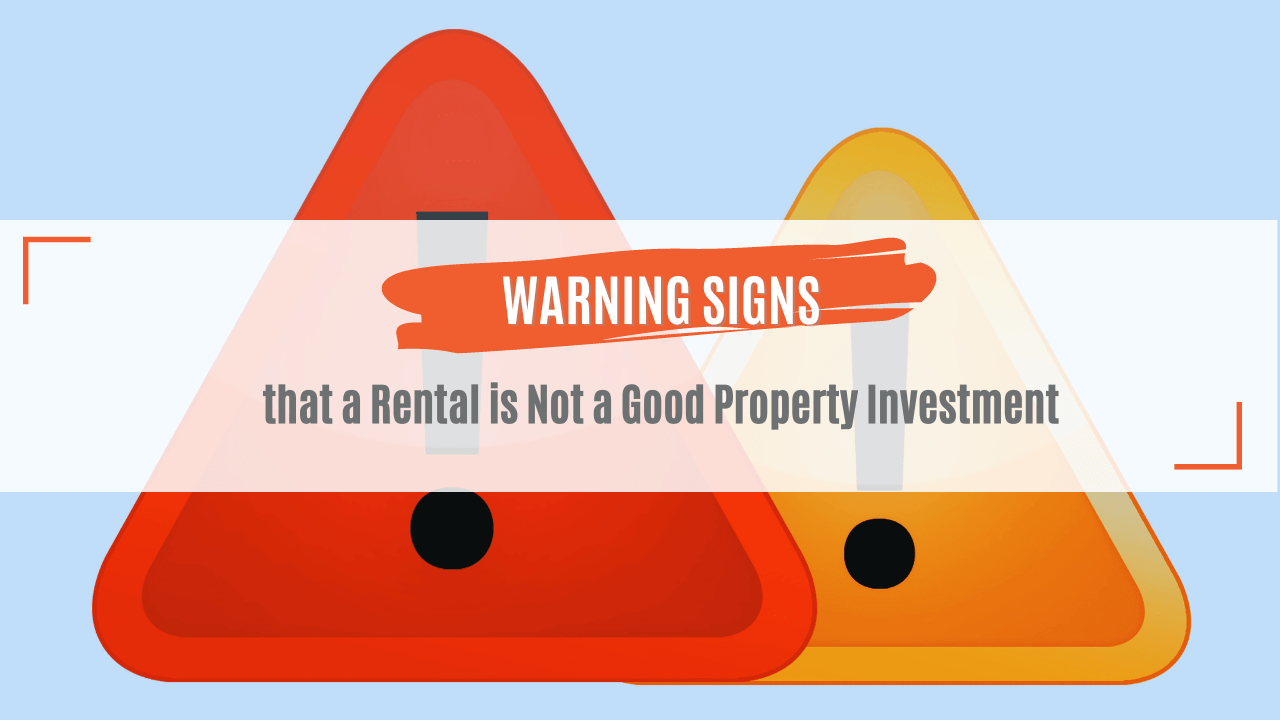
To invest successfully in Portland real estate, you have to buy the right property.
How do you know that the rental home you’re buying will be a good investment? Typically, a good investment property is located in a desirable neighborhood, well-maintained and in good condition, and bursting with curb appeal. You need to know your property will appeal to good tenants who are likely to pay rent on time, take good care of the home, and follow the terms of the lease agreement.
How do you know if a property is not a good investment?
There are several warning signs, and we’re taking a look at what those might be.
Warning Signs to Heed BEFORE You Invest
It always works out better when you’re able to recognize the warning signs about an investment property before you buy it. You’ll save yourself a lot of money and frustration when you can see the problems ahead of time.
Here are some of the warning signs to look for when you’re considering a rental property but you’re not sure it’s the best choice.
Terrible Portland Rental Property Location
A property with poor location offers numerous challenges that can result in a loss of investment income. One of the significant risks of investing in a property that isn’t well-located is the reduced demand. Properties located in remote areas or unsafe neighborhoods will not attract the tenants you need in order to be profitable. When your rental home remains vacant, there’s no income for you, and your costs continue to rise on an investment that isn’t making you any money.
Successful investment properties are in desirable neighborhoods that tenants are eager to live in. You’re more likely to secure high-quality tenants and enjoy consistent returns on your investment. Don’t think that the perfect property will make a great rental even if the location isn’t ideal. Location matters a lot.
Another danger of investing in properties with poor locations is the negative impact that location will have on your property value. A property's location influences its value in the market. A property located minutes from shopping centers, parks, and reputable schools can command a higher price than one situated in heavily industrial neighborhoods or far from essential services. Properties in poor locations often lose their market values, and it can be challenging to recoup investments later on when selling.
Safe neighborhoods are essential when tenants are looking for a new home. If you don’t pay attention to the crime statistics before you buy, you could find yourself spending a lot of money on a property that ultimately won’t get rented. And, when your property is vacant in a neighborhood that doesn’t attract tenants, it’s vulnerable to crime and theft, and vandalism. You could find appliances missing or a squatter taking over the home.
HOA neighborhoods often seem like a good investment, and they usually are. However, you’ll need to spend some time examining the bylaws of the community as well as the rules and regulations. There may be some restrictions on rental properties and tenants. That could make renting out your investment a bit more difficult. Find out if there are waiting periods, limits to how many homes in the community can be rented, and other requirements. Some HOAs will want to screen tenants in addition to your own screening process. They may not allow pets. An investment property in a highly restrictive HOA may not be as successful as you’d imagine.
Extensive and Expensive Work is Needed
It’s tempting to want to buy a rental property that’s less expensive than others on the market. It feels like you’re getting a deal. And you are, but at what cost?
If your investment goals are specifically geared towards inexpensive investment properties that need a lot of remodeling and renovation, you know what you’re looking for. But, if you’re not looking for those distressed properties intentionally, stay away from them when you’re ready to invest. They’re going to cost you a lot of money in rehab expenses, but even worse – it will take you a lot of time before you’re able to list them on the rental market. Those homes will not be rent-ready immediately, and that’s going to be expensive in both the short and long term.
Cosmetic upgrades and updates are expected when you invest in real estate. You’ll probably want to do some painting and cleaning before you begin marketing the property and placing residents. However, you don’t want to spend more than a couple of weeks getting the home ready for the rental market. You lose money every day the property isn’t occupied.
Buying an investment property that needs a lot of work isn’t a great idea. Buy something that’s in good condition and ready to be rented. You’ll earn more money.
Likely Portland Rents are Not High
Talk to a Portland property manager about how much you can expect to earn from the property you’re considering. You need accurate data and reliable information about how long it will take to rent the property and what the rental value is likely to be. If the numbers don’t add up, the property is not worth your investment. Before buying an investment property, it’s important to understand the average rent prices in the area and for properties like the one you’re considering. By understanding this, you ensure that you’re not buying a property with unprofitable rent rates.
Warning Signs You Already Own a Bad Investment
Sometimes, you’ll buy an investment property with the highest hopes. What might make you worry that you’ve made a mistake? Long vacancy periods. High tenant turnover rates. Maintenance that’s far more expensive than you’ve budgeted to spend.
It’s disconcerting to realize after you’ve already made the investment that you might be holding onto a property that isn’t going to provide the income and the return on investment (ROI) that you were hoping to earn.
Here are some of those warning signs, and some ideas on what to do.
Maintenance Costs are Prohibitive
Maintenance is always an expense that real estate investors must budget for. You’re going to have repairs that are necessary, and you’ll want to invest in preventative maintenance in order to protect the condition and the value of your investment.
When you realize that your investment property needs more maintenance than you’ve budgeted for, it can be discouraging. Perhaps there is more work that’s needed than you realized. Or, you could find that emergencies are happening more frequently. You did not expect that a new water heater would be needed so soon or that all of the appliances would begin to deteriorate as soon as a tenant moved in and began using them regularly.
The amount of maintenance you need will typically depend on the age and condition of your property. Make sure you have a complete inspection done before you buy. And, if you find that the maintenance costs are much higher than you anticipated, consider selling the investment. You can release the property through a 1031 exchange and buy something that’s less expensive to maintain.
Attracting and Retaining Tenants is Difficult
Properties with high vacancy rates may not be worth the investment. This is another essential metric to consider when you’ve bought a rental property and you’re wondering if you’ve made a bad investment. Before you invest, you’ll want to spend time researching the vacancy rates in the area so you know what to expect. If you find you’re unable to attract a tenant, you’ll have to lower your rental rate or offer incentives that will get tenants interested in your property.
Turnover is often even more expensive than vacancy. Not only is rent not coming in, you’re also spending money on repairs and upgrades, and preparations for the next tenant you’re hoping to place. If tenants are unwilling to stay in your property beyond the initial lease term, find out what they don’t like about the rental home.
When the only tenants you’re able to attract are unreliable renters who fall behind in rental payments, fail to report maintenance issues, or violate the lease agreement, there’s also a good chance that you’ve made a bad investment.
Investing in a rental property is meant to be a long-term commitment. With the right investment, the longer you hold onto the property, the more money you’re likely to earn on it. With a bad investment property, however, you want to get rid of it right away. When things can be easily managed to turn the investment around, you’re in luck. If you cannot seem to make the property profitable, however,, it’s better to release it and move on. Find something else to buy before you end up losing more money than you can recoup.
 Working with a Portland property management company before you invest can result in better decisions about what to buy. We can help you estimate the likely rental value of a property, and we can also give you an idea of what you’ll spend on maintenance, how long it will take to find a tenant, and what your vacancy and turnover rates are likely to be.
Working with a Portland property management company before you invest can result in better decisions about what to buy. We can help you estimate the likely rental value of a property, and we can also give you an idea of what you’ll spend on maintenance, how long it will take to find a tenant, and what your vacancy and turnover rates are likely to be.
If you’d like to talk about your current or potential real estate investments, contact us at PropM, Inc. We are open seven days a week to serve and discuss your rental properties.

